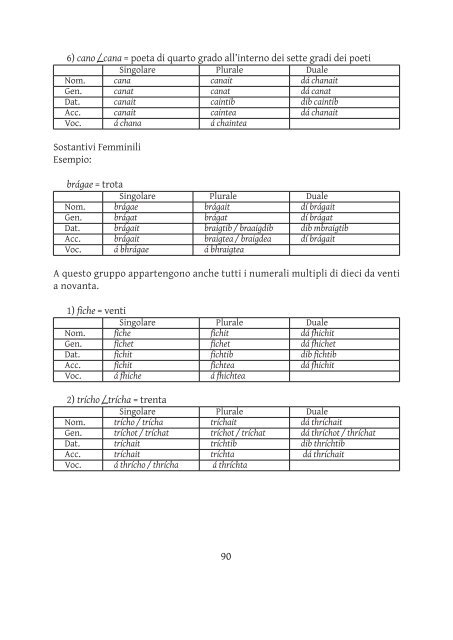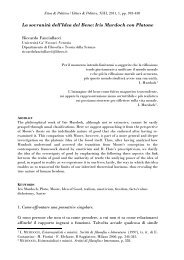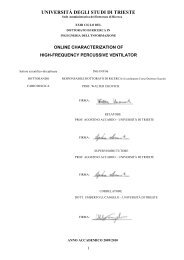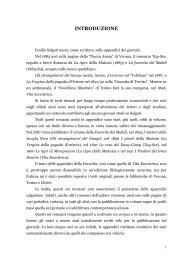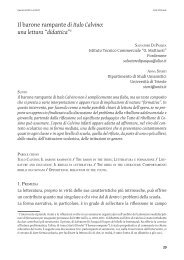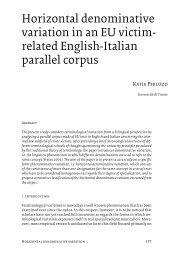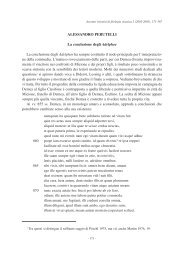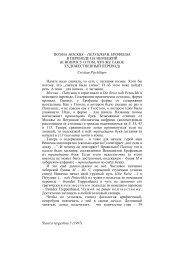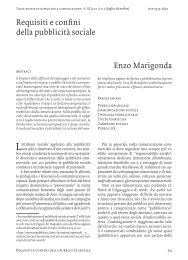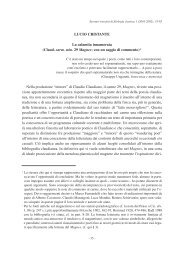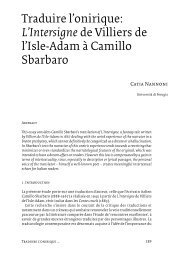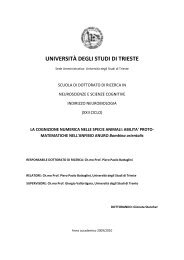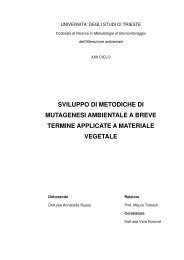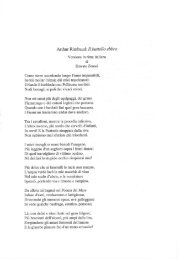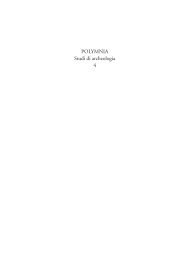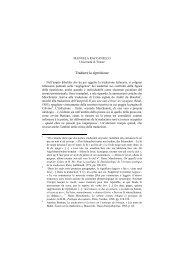- Page 1 and 2:
Introduzione alla storia della ling
- Page 3 and 4:
Temi consonantici 113 Comparazione
- Page 5 and 6:
per così dire incrociata all’int
- Page 7 and 8:
tri studiosi hanno messo in rilevan
- Page 9 and 10:
PROTO-CELTICO Per quanto concerne l
- Page 11 and 12:
Sempre in proto-celtico, inoltre, s
- Page 13 and 14:
STADI DELLA LINGUA GAELICA D’IRLA
- Page 15 and 16:
no un ruolo di semplici varianti al
- Page 17 and 18:
Vocali Brevi i e a o u Lunghe ī ē
- Page 19 and 20:
PALATALIzzAzIONE CONSONANTICA Uno d
- Page 21 and 22:
LENIzIONE CONSONANTICA Come ho già
- Page 23 and 24:
degli allofoni palatali e non palat
- Page 25 and 26:
FONTI RELATIVE ALLO STUDIO DEGLI ST
- Page 27 and 28:
1922. Patterson fa anche presente c
- Page 29 and 30:
IRLANDESE ARCAICO Come ho già spie
- Page 31 and 32:
IRLANDESE ANTICO Con il termine di
- Page 33 and 34:
consonanti entrambe di qualità pal
- Page 35 and 36:
Per tali motivi, per l’irlandese
- Page 37 and 38:
Gen. forma più antica inna, forma
- Page 39 and 40: ar t i c o l o ne u t r o fo r M e
- Page 41 and 42: IL SOSTANTIVO 1) pa r t e generale
- Page 43 and 44: PARADIGMI DEI TEMI VOCALICI E CONSO
- Page 45 and 46: 3) ech = cavallo Singolare Plurale
- Page 47 and 48: 3) dliged = legge Singolare Plurale
- Page 49 and 50: Declinazione dei temi in -ā A ques
- Page 51 and 52: 5) croch = croce Singolare Plurale
- Page 53 and 54: 1a ) Sostantivi maschili Nom. Sg./
- Page 55 and 56: Sostantivi neutri Esempi: 1) cride
- Page 57 and 58: Sostantivi neutri Esempio: la = gio
- Page 59 and 60: 7) fine = gruppo familiare Singolar
- Page 61 and 62: 2) adaig = notte Singolare Plurale
- Page 63 and 64: 1 b ) Sostantivi neutri Nom. sg./ D
- Page 65 and 66: 8) fogail = divisione Singolare Plu
- Page 67 and 68: 2) liaig = medico Singolare Plurale
- Page 69 and 70: 4) meth = decadimento, rovina Singo
- Page 71 and 72: 2) guth = voce Singolare Plurale Du
- Page 73 and 74: Sostantivi Neutri Esempi: 1) dorus
- Page 75 and 76: 1 a ) Sostantivi maschili e femmini
- Page 77 and 78: 7) ail = roccia, scogliera Singolar
- Page 79 and 80: Sostantivi femminili Esempi: 1) ca
- Page 81 and 82: de c l i n a z i o n e d e i t e M
- Page 83 and 84: Sostantivi femminili Esempio: áui
- Page 85 and 86: Sostantivi terminanti con la vocale
- Page 87 and 88: 4) eirr = combattente in un carro S
- Page 89: Sostantivi maschili Esempi: 1) cara
- Page 93 and 94: 3) triath = mare Singolare Plurale
- Page 95 and 96: Sostantivi femminili Sostantivi ter
- Page 97 and 98: 16) tíchtu = il venire (nome verba
- Page 99 and 100: 3) greim = morso Singolare Plurale
- Page 101 and 102: 3) bráthair = fratello F. singolar
- Page 103 and 104: 8) leth = lato Singolare Plurale Du
- Page 105 and 106: L’AGGETTIVO Gli aggettivi, a diff
- Page 107 and 108: 3) labar = arrogante Maschile Singo
- Page 109 and 110: 9) bocht = povero Maschile Singolar
- Page 111 and 112: 5) nemdae = sacro Maschile Singolar
- Page 113 and 114: 2) fliuch = bagnato, umido Singolar
- Page 115 and 116: tromm (pesante) = trummu (più pesa
- Page 117 and 118: Nel caso in cui questo numerale si
- Page 119 and 120: Alcuni di questi numerali personali
- Page 121 and 122: PRONOMI pr o n o M i personali La m
- Page 123 and 124: Classe B Maschile Femminile Neutro
- Page 125 and 126: 6) ís = sotto (causa lenizione) Ma
- Page 127 and 128: 9) dar, tar = oltre, attraverso Mas
- Page 129 and 130: PRONOMI DIMOSTRATIVI 1) Il pronome
- Page 131 and 132: La particella relativa si congiunge
- Page 133 and 134: La particella ro, in origine una pr
- Page 135 and 136: Modi In antico gaelico si distinguo
- Page 137 and 138: Per quanto riguarda i verbi forti,
- Page 139 and 140: di seconda classe presentano al con
- Page 141 and 142:
Esempi: cechna fut. 3 sg. di canaid
- Page 143 and 144:
Esempi: acht pret. 3 sg. di agid
- Page 145 and 146:
Esempi: márbad pret. Pass. di már
- Page 147 and 148:
Presente Indicativo Forma assoluta
- Page 149 and 150:
Futuro Passivo Condizionale Passivo
- Page 151 and 152:
Presente Indicativo Forma assoluta
- Page 153 and 154:
Presente Indicativo Forma assoluta
- Page 155 and 156:
nertaid ‘rafforzare/rinforzare’
- Page 157 and 158:
for-cenn ‘finire’ Forme attive
- Page 159 and 160:
comalnaithir ‘completare/portare
- Page 161 and 162:
Presente Indicativo Forma assoluta
- Page 163 and 164:
Presente Indicativo Forma assoluta
- Page 165 and 166:
Presente Indicativo Forma assoluta
- Page 167 and 168:
ve r b i d e p o n e n t i gúaigid
- Page 169 and 170:
ainmnigidir ‘nominare’ Forme at
- Page 171 and 172:
suidigir ‘fissare/porre/stabilire
- Page 173 and 174:
3) Verbi deboli con iato ad-cí ‘
- Page 175 and 176:
do-gní ‘fare’ Forme attive Pre
- Page 177 and 178:
as-lui ‘fuggire’ Presente Indic
- Page 179 and 180:
PARADIGMI VERBI FORTI 1 a classe be
- Page 181 and 182:
erid presenta anche delle forme sup
- Page 183 and 184:
Presente Indicativo Forma assoluta
- Page 185 and 186:
Presente Indicativo Forma assoluta
- Page 187 and 188:
Forme supplettive derivate dalla ra
- Page 189 and 190:
Forme passive Indicativo Presente C
- Page 191 and 192:
Presente Indicativo Forma assoluta
- Page 193 and 194:
1 sg. tíag 2 sg. eirg 3 sg. tét 1
- Page 195 and 196:
nascid ‘vincolare’ Presente Ind
- Page 197 and 198:
Preterito Forma assoluta 1 sg. dolu
- Page 199 and 200:
Presente Indicativo Forma assoluta
- Page 201 and 202:
Presente Indicativo Forma assoluta
- Page 203 and 204:
Presente Indicativo Forma assoluta
- Page 205 and 206:
Presente Indicativo Forma assoluta
- Page 207 and 208:
Forme passive Presente Indicativo I
- Page 209 and 210:
Presente Indicativo Forma assoluta
- Page 211 and 212:
midithir ‘stimare/giudicare’ Fo
- Page 213 and 214:
do-moinethar/do-muinethar’pensare
- Page 215 and 216:
Presente Indicativo Forma assoluta
- Page 217 and 218:
Presente Indicativo Forma assoluta
- Page 219 and 220:
fo-loing ‘dare supporto’ Forme
- Page 221 and 222:
in-loing ‘unire’ 1 sg. 2 sg. Pr
- Page 223 and 224:
Forme passive Presente Indicativo F
- Page 225 and 226:
Forme Passive Presente Indicativo P
- Page 227 and 228:
FORME PASSIVE Presente Indicativo P
- Page 229 and 230:
FORME PASSIVE Presente Indicativo F
- Page 231 and 232:
dinid/denid ‘succhiare’ Present
- Page 233 and 234:
tlenaid ‘portare via/rubare’ Pr
- Page 235 and 236:
FORME PASSIVE Presente Indicativo F
- Page 237 and 238:
FORME PASSIVE Presente Indicativo F
- Page 239 and 240:
FORME PASSIVE Presente Indicativo P
- Page 241 and 242:
ara-chrin ‘decadere’ Presente I
- Page 243 and 244:
Presente Indicativo Presente Indica
- Page 245 and 246:
Futuro Forme Assolute Futuro Forme
- Page 247 and 248:
Presente Indicativo Forme Assolute
- Page 249 and 250:
Passato Congiuntivo Forme congiunte
- Page 251 and 252:
INDICE Introduzione allo studio del


